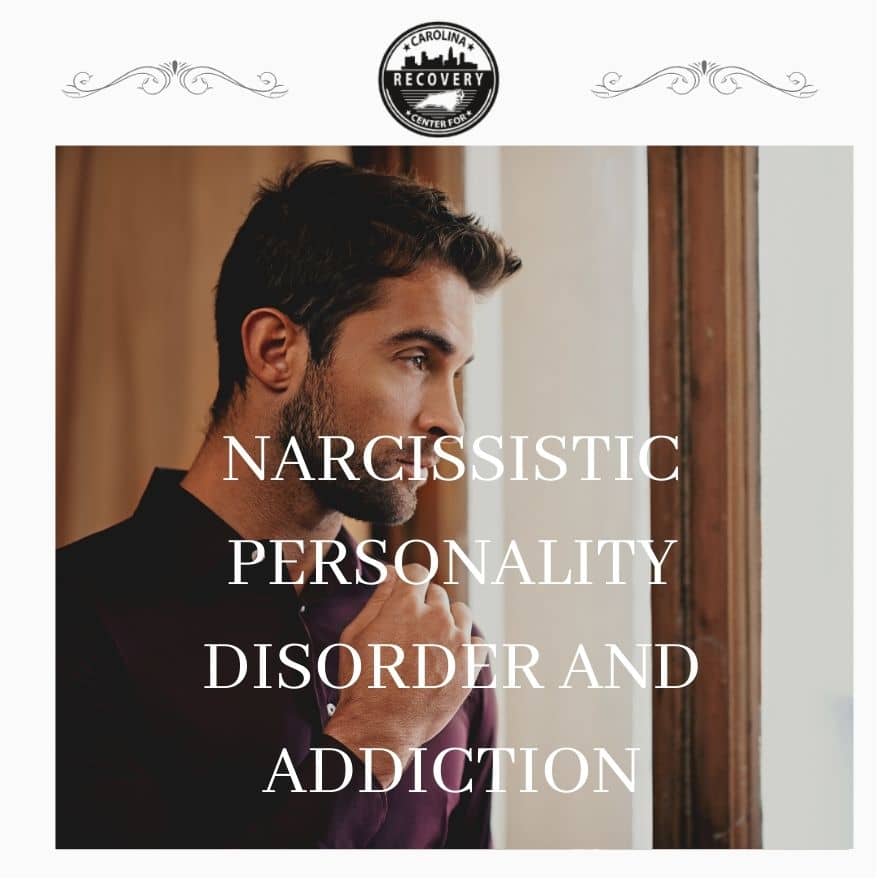Narcissistic Personality Disorder and Addiction

Medically Verified: 2/1/24
Medical Reviewer
Chief Editor

All of the information on this page has been reviewed and verified by a certified addiction professional.
Co-occurring disorders are described as the coexistence of both a substance use disorder and a mental health condition. According to The Substance Abuse and Mental Health Services Administration (SAMHSA), “People with mental illness are more likely to experience a substance use disorder than those not affected by a mental illness.”[1] At the same time, addiction can lead to the development of a mental health condition.
The 2018 National Survey on Drug Use and Health found that about 9.2 million Americans have a co-occurring disorder.[2] Some of the most common mental disorders that coexist with addiction include generalized anxiety, post-traumatic stress disorder, and depression. While occurring less frequently, connections between narcissistic personality disorder and addiction have also been found. A narcissistic personality disorder is a condition where an individual experiences an inflated sense of self-importance that causes them to disregard the feelings of others.
Like other mental and behavioral health conditions, people with narcissistic personality disorder may be at an increased risk for addiction.
What is Narcissistic Personality Disorder (NPD)?
As previously mentioned, the basis of narcissistic personality disorder (NPD) is an inflated sense of self-importance. While people with NPD display selfish behaviors and appear to lack empathy, this is due to a severely fragile sense of self-worth. Individuals with narcissistic personality disorder are often stigmatized due to the presentation of their symptoms and a lack of understanding from the general public.
From the outside looking in, people may view individuals with NPD as selfish, greedy, and obsessed with praise. However, people struggling with this condition have significant self-esteem issues that cause them to feel insecure, empty, and insignificant. This is what causes individuals with NPD to continuously speak of themselves in high regard and seek praise from others around them.
The Symptoms of Narcissistic Personality Disorder
According to The National Institutes of Health, “Narcissistic personality disorder (NPD) is characterized by a pervasive pattern of grandiosity, need for admiration, interpersonal exploitativeness, and lack of empathy, beginning in early adulthood and manifest in a variety of contexts.”[3]
There are an array of symptoms associated with a narcissistic personality disorder. To be diagnosed with NPD, individuals must identify with at least 5 of the following traits:
- An overinflated sense of self-importance
- Feeling like it’s necessary to be more loved, successful, intelligent, and attractive than other people
- Feeling better than everyone else and only being attracted to individuals with a high social status
- Constant desire for admiration
- Feeling entitled
- Being willing to take advantage of other people to meet personal goals
- Displaying a lack of understanding or concern for the needs and emotions of other people
- Behaviors and attitudes that appear arrogant or snobby
Narcissistic Personality Disorder and Addiction
Individuals with NPD have a strong desire to receive praise from others. Their need for praise and approval is so strong that it could be referred to as compulsive. When someone with NPD does not receive the admiration they desire, they often act out in extreme ways. This could manifest in an individual throwing a fit, displaying violent tendencies, using manipulation tactics, and much more. After the individual acts out, they may begin to abuse drugs and alcohol in an attempt to soothe their uncomfortable emotions.
This pattern of self-medication can easily spiral into a substance use disorder.
When an individual with narcissistic personality disorder develops an addiction, it can become extremely dangerous. Because of the individual’s inflated sense of self, they are likely to deny that they have a problem with substance abuse. The individual will not want to admit that they are anything but perfect, because of the low self-worth they experience internally. As a result, they become trapped in the cycle of addiction.
The Similarities Between Narcissism and Addiction
Surprisingly, narcissistic personality disorder and addiction have a few symptoms in common. Because of this, some individuals struggling with a substance use disorder may have a hard time getting diagnosed with NPD until they attend professional addiction treatment.
The symptoms that are shared between NPD and addiction include:
- Self-medication
- Avoiding difficult emotions
- Denial and shame
- Low self-esteem
- Codependency
- Rationalizing and minimizing
- Black and white thoughts
- Violent tendencies or frequent bouts of anger
- Issues with control
Dual Diagnosis Treatment for Narcissistic Personality Disorder and Substance Abuse
Individuals suffering from both NPD and addiction must attend a dual diagnosis treatment program. For an individual to successfully recover, both conditions must be treated simultaneously.
If the individual is only treated for their issues with addiction, the symptoms of their untreated NPD may trigger a relapse. Dual diagnosis treatment centers combine traditional mental health treatment tactics with evidence-based addiction recovery modalities.
Treatments used in dual diagnosis treatment include:
- Medically-assisted drug detox
- Individual and group therapy
- Family counseling
- Cognitive-behavioral therapy (CBT)
- Dialectical behavior therapy (DBT)
- Motivational interviewing (MI)
- Somatic experiencing therapy
- Experiential therapy
- Holistic therapy (art, music, yoga, meditation)
- Mindfulness-based therapy
- Relapse prevention planning
Find a Dual Diagnosis Rehab Center in North Carolina Today
The key to recovery is personalized care that is comprehensive and intensive to ensure that individuals receive full therapeutic support and intervention. At Carolina Center to Recovery, we’re dedicated to empowering everyone who suffers from co-occurring disorders so that they can make increasing progress on their road to recovery.
If your or your loved one is in need of dual diagnosis treatment for mental health and addiction, give us a call today.
References:
- https://www.samhsa.gov/medication-assisted-treatment/medications-counseling-related-conditions/co-occurring-disorders
- https://store.samhsa.gov/product/key-substance-use-and-mental-health-indicators-in-the-united-states-results-from-the-2018-national-survey-on-Drug-Use-and-Health/PEP19-5068
- https://www.ncbi.nlm.nih.gov/pmc/articles/PMC2669224/

